Inbal Nahum-Shani
A Deployed Online Reinforcement Learning Algorithm In An Oral Health Clinical Trial
Sep 03, 2024



Abstract:Dental disease is a prevalent chronic condition associated with substantial financial burden, personal suffering, and increased risk of systemic diseases. Despite widespread recommendations for twice-daily tooth brushing, adherence to recommended oral self-care behaviors remains sub-optimal due to factors such as forgetfulness and disengagement. To address this, we developed Oralytics, a mHealth intervention system designed to complement clinician-delivered preventative care for marginalized individuals at risk for dental disease. Oralytics incorporates an online reinforcement learning algorithm to determine optimal times to deliver intervention prompts that encourage oral self-care behaviors. We have deployed Oralytics in a registered clinical trial. The deployment required careful design to manage challenges specific to the clinical trials setting in the U.S. In this paper, we (1) highlight key design decisions of the RL algorithm that address these challenges and (2) conduct a re-sampling analysis to evaluate algorithm design decisions. A second phase (randomized control trial) of Oralytics is planned to start in spring 2025.
MiWaves Reinforcement Learning Algorithm
Aug 27, 2024



Abstract:The escalating prevalence of cannabis use poses a significant public health challenge globally. In the U.S., cannabis use is more prevalent among emerging adults (EAs) (ages 18-25) than any other age group, with legalization in the multiple states contributing to a public perception that cannabis is less risky than in prior decades. To address this growing concern, we developed MiWaves, a reinforcement learning (RL) algorithm designed to optimize the delivery of personalized intervention prompts to reduce cannabis use among EAs. MiWaves leverages domain expertise and prior data to tailor the likelihood of delivery of intervention messages. This paper presents a comprehensive overview of the algorithm's design, including key decisions and experimental outcomes. The finalized MiWaves RL algorithm was deployed in a clinical trial from March to May 2024.
Oralytics Reinforcement Learning Algorithm
Jun 19, 2024



Abstract:Dental disease is still one of the most common chronic diseases in the United States. While dental disease is preventable through healthy oral self-care behaviors (OSCB), this basic behavior is not consistently practiced. We have developed Oralytics, an online, reinforcement learning (RL) algorithm that optimizes the delivery of personalized intervention prompts to improve OSCB. In this paper, we offer a full overview of algorithm design decisions made using prior data, domain expertise, and experiments in a simulation test bed. The finalized RL algorithm was deployed in the Oralytics clinical trial, conducted from fall 2023 to summer 2024.
reBandit: Random Effects based Online RL algorithm for Reducing Cannabis Use
Feb 27, 2024



Abstract:The escalating prevalence of cannabis use, and associated cannabis-use disorder (CUD), poses a significant public health challenge globally. With a notably wide treatment gap, especially among emerging adults (EAs; ages 18-25), addressing cannabis use and CUD remains a pivotal objective within the 2030 United Nations Agenda for Sustainable Development Goals (SDG). In this work, we develop an online reinforcement learning (RL) algorithm called reBandit which will be utilized in a mobile health study to deliver personalized mobile health interventions aimed at reducing cannabis use among EAs. reBandit utilizes random effects and informative Bayesian priors to learn quickly and efficiently in noisy mobile health environments. Moreover, reBandit employs Empirical Bayes and optimization techniques to autonomously update its hyper-parameters online. To evaluate the performance of our algorithm, we construct a simulation testbed using data from a prior study, and compare against commonly used algorithms in mobile health studies. We show that reBandit performs equally well or better than all the baseline algorithms, and the performance gap widens as population heterogeneity increases in the simulation environment, proving its adeptness to adapt to diverse population of study participants.
Monitoring Fidelity of Online Reinforcement Learning Algorithms in Clinical Trials
Feb 26, 2024
Abstract:Online reinforcement learning (RL) algorithms offer great potential for personalizing treatment for participants in clinical trials. However, deploying an online, autonomous algorithm in the high-stakes healthcare setting makes quality control and data quality especially difficult to achieve. This paper proposes algorithm fidelity as a critical requirement for deploying online RL algorithms in clinical trials. It emphasizes the responsibility of the algorithm to (1) safeguard participants and (2) preserve the scientific utility of the data for post-trial analyses. We also present a framework for pre-deployment planning and real-time monitoring to help algorithm developers and clinical researchers ensure algorithm fidelity. To illustrate our framework's practical application, we present real-world examples from the Oralytics clinical trial. Since Spring 2023, this trial successfully deployed an autonomous, online RL algorithm to personalize behavioral interventions for participants at risk for dental disease.
Dyadic Reinforcement Learning
Aug 27, 2023Abstract:Mobile health aims to enhance health outcomes by delivering interventions to individuals as they go about their daily life. The involvement of care partners and social support networks often proves crucial in helping individuals managing burdensome medical conditions. This presents opportunities in mobile health to design interventions that target the dyadic relationship -- the relationship between a target person and their care partner -- with the aim of enhancing social support. In this paper, we develop dyadic RL, an online reinforcement learning algorithm designed to personalize intervention delivery based on contextual factors and past responses of a target person and their care partner. Here, multiple sets of interventions impact the dyad across multiple time intervals. The developed dyadic RL is Bayesian and hierarchical. We formally introduce the problem setup, develop dyadic RL and establish a regret bound. We demonstrate dyadic RL's empirical performance through simulation studies on both toy scenarios and on a realistic test bed constructed from data collected in a mobile health study.
Reward Design For An Online Reinforcement Learning Algorithm Supporting Oral Self-Care
Aug 15, 2022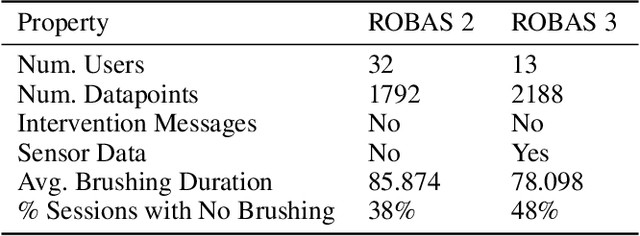
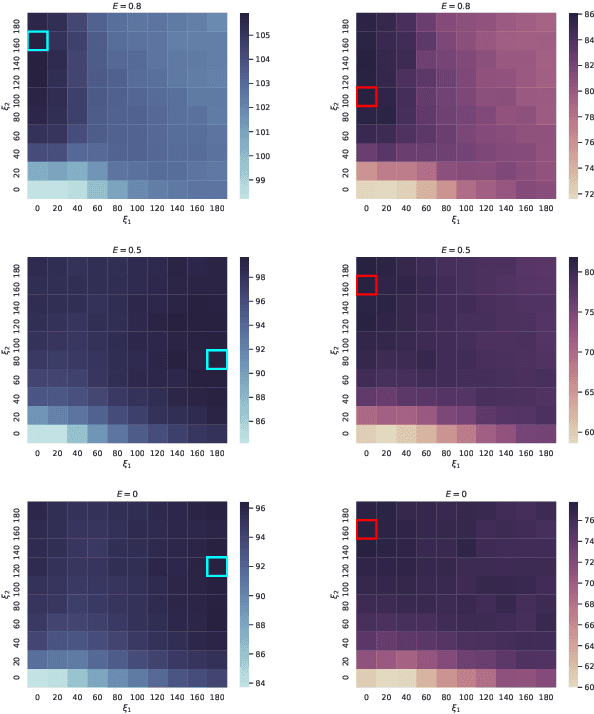

Abstract:Dental disease is one of the most common chronic diseases despite being largely preventable. However, professional advice on optimal oral hygiene practices is often forgotten or abandoned by patients. Therefore patients may benefit from timely and personalized encouragement to engage in oral self-care behaviors. In this paper, we develop an online reinforcement learning (RL) algorithm for use in optimizing the delivery of mobile-based prompts to encourage oral hygiene behaviors. One of the main challenges in developing such an algorithm is ensuring that the algorithm considers the impact of the current action on the effectiveness of future actions (i.e., delayed effects), especially when the algorithm has been made simple in order to run stably and autonomously in a constrained, real-world setting (i.e., highly noisy, sparse data). We address this challenge by designing a quality reward which maximizes the desired health outcome (i.e., high-quality brushing) while minimizing user burden. We also highlight a procedure for optimizing the hyperparameters of the reward by building a simulation environment test bed and evaluating candidates using the test bed. The RL algorithm discussed in this paper will be deployed in Oralytics, an oral self-care app that provides behavioral strategies to boost patient engagement in oral hygiene practices.
Designing Reinforcement Learning Algorithms for Digital Interventions: Pre-implementation Guidelines
Jun 08, 2022



Abstract:Online reinforcement learning (RL) algorithms are increasingly used to personalize digital interventions in the fields of mobile health and online education. Common challenges in designing and testing an RL algorithm in these settings include ensuring the RL algorithm can learn and run stably under real-time constraints, and accounting for the complexity of the environment, e.g., a lack of accurate mechanistic models for the user dynamics. To guide how one can tackle these challenges, we extend the PCS (Predictability, Computability, Stability) framework, a data science framework that incorporates best practices from machine learning and statistics in supervised learning (Yu and Kumbier, 2020), to the design of RL algorithms for the digital interventions setting. Further, we provide guidelines on how to design simulation environments, a crucial tool for evaluating RL candidate algorithms using the PCS framework. We illustrate the use of the PCS framework for designing an RL algorithm for Oralytics, a mobile health study aiming to improve users' tooth-brushing behaviors through the personalized delivery of intervention messages. Oralytics will go into the field in late 2022.
Transformers for prompt-level EMA non-response prediction
Nov 01, 2021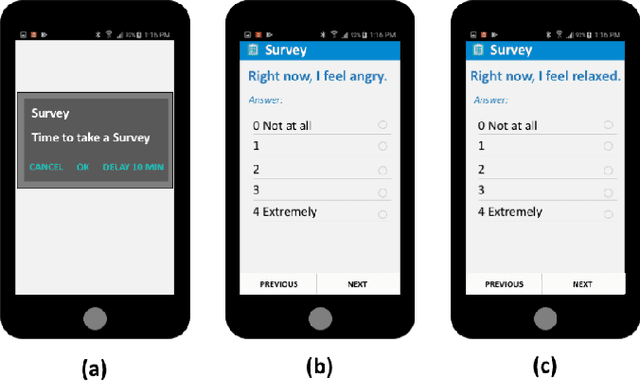
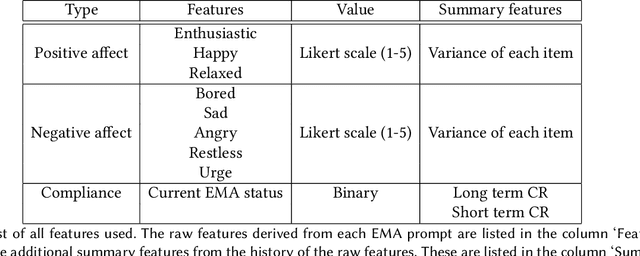
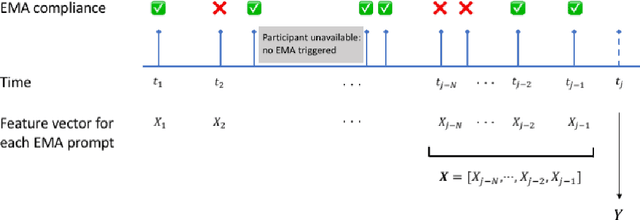

Abstract:Ecological Momentary Assessments (EMAs) are an important psychological data source for measuring current cognitive states, affect, behavior, and environmental factors from participants in mobile health (mHealth) studies and treatment programs. Non-response, in which participants fail to respond to EMA prompts, is an endemic problem. The ability to accurately predict non-response could be utilized to improve EMA delivery and develop compliance interventions. Prior work has explored classical machine learning models for predicting non-response. However, as increasingly large EMA datasets become available, there is the potential to leverage deep learning models that have been effective in other fields. Recently, transformer models have shown state-of-the-art performance in NLP and other domains. This work is the first to explore the use of transformers for EMA data analysis. We address three key questions in applying transformers to EMA data: 1. Input representation, 2. encoding temporal information, 3. utility of pre-training on improving downstream prediction task performance. The transformer model achieves a non-response prediction AUC of 0.77 and is significantly better than classical ML and LSTM-based deep learning models. We will make our a predictive model trained on a corpus of 40K EMA samples freely-available to the research community, in order to facilitate the development of future transformer-based EMA analysis works.
A Functional EM Algorithm for Panel Count Data with Missing Counts
Mar 28, 2020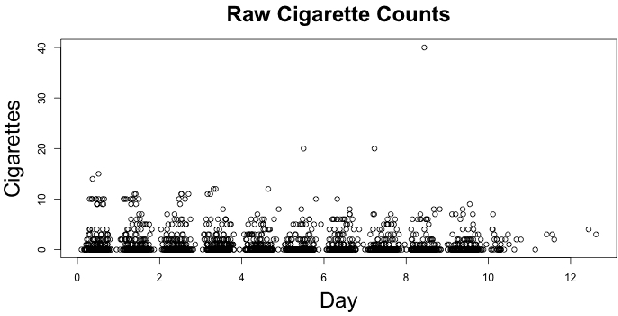
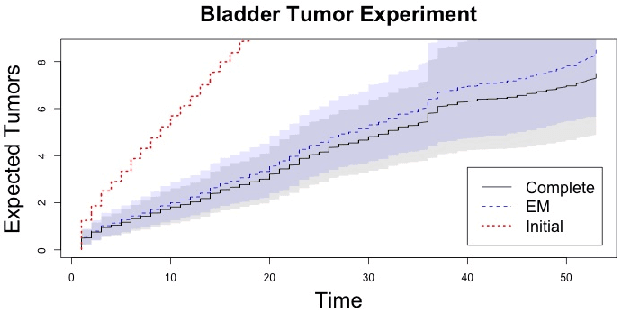
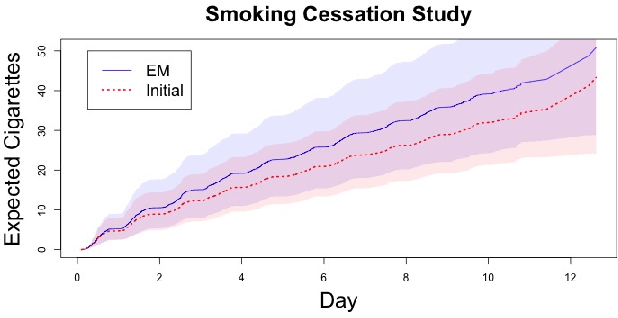

Abstract:Panel count data is recurrent events data where counts of events are observed at discrete time points. Panel counts naturally describe self-reported behavioral data, and the occurrence of missing or unreliable reports is common. Unfortunately, no prior work has tackled the problem of missingness in this setting. We address this gap in the literature by developing a novel functional EM algorithm that can be used as a wrapper around several popular panel count mean function inference methods when some counts are missing. We provide a novel theoretical analysis of our method showing strong consistency. Extending the methods in (Balakrishnan et al., 2017, Wu et al. 2016), we show that the functional EM algorithm recovers the true mean function of the counting process. We accomplish this by developing alternative regularity conditions for our objective function in order to show convergence of the population EM algorithm. We prove strong consistency of the M-step, thus giving strong consistency guarantees for the finite sample EM algorithm. We present experimental results for synthetic data, synthetic missingness on real data, and a smoking cessation study, where we find that participants may underestimate cigarettes smoked by approximately 18.6% over a 12 day period.
 Add to Chrome
Add to Chrome Add to Firefox
Add to Firefox Add to Edge
Add to Edge